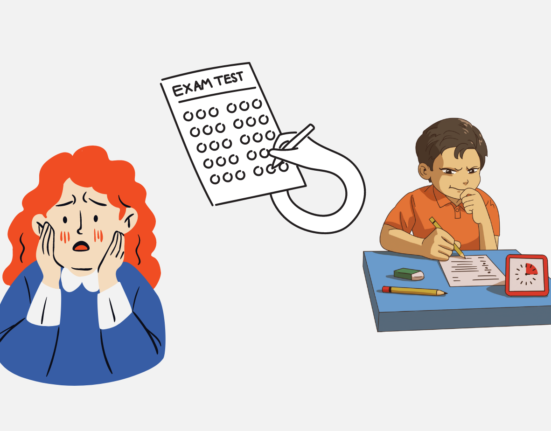A band score of 7.5 is one of the coveted goals for IELTS test-takers. This band score indicates a relatively high level of proficiency in using English compared to native speakers and opens up opportunities for studying abroad, immigrating to foreign countries, and advancing in one’s career. To achieve this score, IELTS learners need a systematic IELTS study plan from 0 to 7.5. Let’s delve into the details in the following section!
1. Identify the requirements to achieve a 7.5 IELTS band score
1.1. The time required to reach a 7.5 IELTS score from scratch:
If you are a beginner in IELTS, your IELTS 7.5 study plan should take at least 14 months and involve studying with a professional curriculum. This program should include practicing reading comprehension and undertaking at least 2 theoretical sessions + 1 practical session for Speaking and Listening skills directly with native speakers.
In addition, depending on the candidate’s proficiency and learning capacity, self-study time at home needs to be scheduled. To achieve this band score, many candidates choose to study IELTS at a center or seek the assistance of a 1:1 private tutor.
On the other hand, a self-guided IELTS 7.5 study plan at home will require more time due to the limitations in exposure to in-depth materials and native-speaker instructors. However, this is just an average timeframe, and the learning process can be expedited based on individual proficiency and determination.
1.2. Requirements to achieve a band score of 7.5 in IELTS:
We all know that the highest band score in IELTS is 9.0. Therefore, a band score of 7.5 is considered quite high. To attain this score, candidates need to use language professionally, making only occasional errors in vocabulary in specific situations. Additionally, candidates should demonstrate a complete mastery of language complexity, understand the nuances in English literature, and have a solid grasp of materials within their specialized field.
To achieve an overall score of 7.5, candidates need to score at least 7.5 in each skill. Among the four IELTS skills, Reading and Listening are the two skills that offer higher scoring opportunities. Therefore, candidates should focus on these two skills. You can set goals such as:
Reading – Listening 8.0-8.5: This score band corresponds to 35 – 38 correct answers out of the total 40 questions in the exam.
Writing – Speaking 6.5-7.0:
For the Writing skill, achieving a band score of 6.5 – 7 is considered a relatively challenging task. When building an IELTS learning path from 0 to 7.5, you need to focus on the scoring criteria for the Writing section, such as:
Task achievement/Task response:
- Fully addressing the requirements of the prompt
- Clearly presenting at least one personal viewpoint related to the prompt
- Providing clear arguments and supporting evidence
Cohesion and Coherence:
- Organizing arguments and evidence logically and coherently
- Ensuring each paragraph corresponds to a specific topic
- Using flexible linking words
Lexical Resource:
- Utilizing a diverse range of vocabulary
- Employing specialized terms or collocations
- Avoiding common words, word misuse, word class errors, and spelling mistakes
Grammar Range and Accuracy:
- Prioritizing the use of complex sentences
- Diversifying sentence structures in the writing
- Minimizing grammar, sentence structure, and punctuation errors
The Speaking skill is also evaluated based on four criteria:
- Fluency and Coherence: Speaking at length with a natural flow and coherence; Establishing connections between ideas
- Lexical Resource: Demonstrating a broad and flexible vocabulary; Using rare words and idioms effectively; Combining words and paraphrasing efficiently
- Grammatical Range and Accuracy: Utilizing simple and complex sentences smoothly; Displaying fluency and only occasional errors with complex structures
- Pronunciation: Pronouncing words clearly, accurately, and comprehensibly; Occasionally encountering pronunciation errors due to difficult words and intonation habits.
2. IELTS Learning Path from 0 to 7.5 in Detail
2.1 Stage 1 of the IELTS 7.5 Learning Path: Building the English Foundation
During this stage, candidates will focus on building and reinforcing foundational knowledge in vocabulary, grammar, and pronunciation. A small note here is that you should not study each skill separately, as it may lead to overload and frustration.
Vocabulary
IELTS is an exam that is divided into clear topics such as Education, Work and Study, Environments, Art, History, Social Issues, etc. Therefore, learners should organize vocabulary according to each topic and commit it to memory. Additionally, to leave a lasting impression while using language with examiners, it is important to emphasize learning through word combinations (collocations) rather than just individual words.
Grammar
You need to study common grammar topics in English, such as:
- 12 tenses in English, especially Present Simple, Past Simple, Future Simple, Present Perfect, etc.
- Parts of speech like adjectives, nouns, verbs, adverbs, and how to use them in sentences.
- The roles of subjects, objects, and adverbs (time, place) in sentences.
- Subject-verb agreement.
- Types of sentences: conditionals with If/Unless/As long as…, direct and indirect, passive, wish sentences, etc.
- Types of clauses: simple, compound, and structures like not only…but also, both…and, neither…nor/either…or…
- Relative clauses (Who/Whom/Which/That) and adverb clauses (When/Where).
Pronunciation
When constructing an IELTS study plan from 0 to 7.5, you need to allocate the initial time to practice pronunciation. You should familiarize yourself with and memorize the correct pronunciation of the International Phonetic Alphabet (IPA) symbols, including 20 vowels and 24 consonants. This is the foundational basis for you to pronounce English words correctly.
Next, you will choose an accent that suits you, whether it’s British English or American English, and follow the appropriate pronunciation in dictionaries. There are two reputable dictionaries that English enthusiasts often choose: Oxford and Cambridge. Additionally, Thesaurus, Urban Dictionary, and Collins are also dictionaries that can be referenced.
A popular and effective method for learning pronunciation is Shadowing – imitating native speakers. You can select movies or videos with the accent you prefer, then repeat their sentences, focusing on pronunciation, intonation, and speed. This method helps learners deeply understand the native speaker’s way of speaking in various situations and develops a similar communication reflex.
Suggested materials for Stage 1 of the self-study IELTS 7.5 learning journey:
- Grammar in Use: A book published by Cambridge – a reputable source. The advantage of this book is its diverse coverage of 140 important grammar topics in English.
- Cambridge Grammar for IELTS: This is a reliable companion on the IELTS learning journey from 0 to 7.5. Also coming from Cambridge University, this book focuses on providing learners of all levels with essential grammar topics in IELTS. The book consists of 25 grammar content sections.
For each content section, learners go through four parts, including Context Listening, Grammar, Grammar Exercises, and Test Practice. With this sequence, learners can grasp the theory while having the opportunity to practice what they have just learned. With these designs, the book will help you learn IELTS grammar quickly and retain it for a long time.
- Pronunciation in Use: This is the renowned pronunciation learning series by Cambridge. The series includes Elementary, Intermediate, and Advanced sections, guiding pronunciation from basic to advanced through 50 – 60 units.

2.2. Stage 2: Getting acquainted and reviewing the basics for each skill
In Stage 2, after establishing a foundation in vocabulary, pronunciation, and basic grammar, you will proceed with the pathways by understanding the structure and requirements of the exam.
On the IELTS learning journey from 0 to 7.5, it is advisable to focus on approaching and practicing the two skills of Reading and Listening first. These are crucial skills that support the remaining two. Reading extensively will help you accumulate vocabulary, and sentence structures, and develop writing skills.
On the other hand, listening extensively aids in improving pronunciation and building communication reflexes. Once you achieve a band score of 4.0 in these two skills, you can begin studying the skills of Speaking and Writing.
Reading
- Goal: At least 15 correct answers
- Study time: 2 hours per day, at least 3 days a week
- Study approach: Read news on websites such as The Guardian, NY Times, and review Part 1 and Part 2 test questions for Reading.
- Reference materials: Newspapers, magazines, journals, and sample test papers from English language centers, as well as books like “Reading Strategies for the IELTS test,” “Get Ready for IELTS Reading,” and “Basic IELTS Reading.
Listening
- Goal: At least 16 correct answers
- Study time: 2 hours per day, at least 3 days a week
- Study approach: Focus on listening to sections 1 and 2, take notes on keywords, and practice listening at various speeds from slow to fast.
- Reference materials: VOA Learning English, BBC Learning English, Ello, Talk English, and diverse topic podcasts.
Speaking
- Goal: At stage 2 of the IELTS learning journey from 0 to 7.5, aim to achieve a band score of 4 for the Speaking skill.
- Study time: 2 hours per day, at least 3 days a week
- Study approach: Practice introducing yourself, family, friends, hobbies, work, and studies for task 1.
- Reference materials: Popular YouTube channels, news channels, news reports, or materials from e-learning platforms.
Writing
- Goal: Band score 4
- Study time: 2 hours per day, at least 3 days a week
- Study approach: Familiarize yourself with task 1 and learn vocabulary related to describing charts, graphs, etc.
- Reference materials: High-scoring IELTS Writing model answers, IELTS Writing, books providing sample essays on various topics and fields.
2.3. Stage 3 of the IELTS 7.5 learning journey: Improving Band Scores for Each Skill
As you progress to Stage 3, your proficiency level is expected to be around IELTS 5.5. At this point, enhancing your knowledge further to tackle more advanced questions is crucial.
Expand Vocabulary and Master Advanced Grammar Topics
During this stage, you should broaden your vocabulary to excel in Part 2 Writing, Part 2-3 Speaking, Part 3 Reading, and Listening. Commonly encountered topics include challenging vocabulary themes such as Technology, Government & Politics, Personal Development, Disease, Weapons, Global Issues, etc. Additionally, idioms should be incorporated into your knowledge base during Stage 3 of the IELTS learning journey from 0 to 7.5.
Reading
Practice answering various question types, including multiple-choice, fill in the blanks, and connecting sentences, while mastering crucial reading comprehension skills like skimming and scanning. Allocate at least one hour each day to solve reputable materials such as Collins – Reading for IELTS, Improve Your Reading Skills, IELTS Reading Recent Actual Test, etc.
Listening
Dedicate time to practice all four listening sections, take notes, and answer questions for at least one hour daily. Utilize reliable practice sources such as Listen a minute, Breaking news English, TEDx, TED Talk, etc
Speaking
Learn how to think and organize ideas in English speech, develop the ability to express thoughts, and arrange them into a coherent and connected speech. Practice speaking in front of a mirror or engage in dialogues with native speakers or instructors at language centers.
Common topics in the IELTS Part 2 speaking test include Health and Pandemic, Sports, Art, Cinema, Childhood, and Memory.
Writing
Master the skill of outlining an essay with a three-part structure, which is crucial on the journey from an IELTS score of 0 to 7.5. Note that the body of the essay should present three main points. Moving on to Task 2, learn how to approach different essay types, create outlines, and develop ideas.
In terms of IELTS Writing preparation materials, you can choose specialized books focusing on vocabulary and grammar, such as English Vocabulary in Use, Cambridge Grammar for IELTS, Get Ready for IELTS Writing, Barron’s Writing for IELTS, Improve your IELTS Writing Skills,…
For the Speaking and Writing sections at this stage, it is advisable to seek support from a teacher, instructor, or native speaker during the learning process.
2.4. Stage 4: Practice Tests and In-Depth Review (6.5 – 7.5+)
During this intensive phase, you will engage in timed practice tests. A piece of advice at this stage is to focus intensely on honing the skills that are your strengths to achieve the highest possible score. For the remaining skills, allocate time to review and correct common mistakes.











